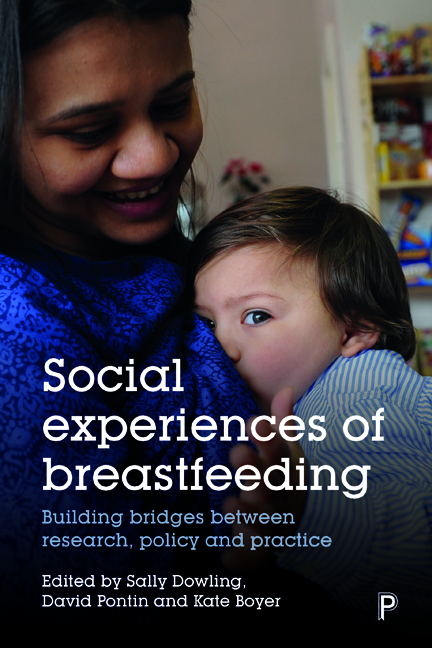Book contents
- Frontmatter
- Dedication
- Contents
- List of tables and figures
- Notes on contributors
- Acknowledgements
- Introduction
- The UK policy context: reconfiguration of the Unicef UK Baby Friendly Initiative to reflect the importance of relationships and ensuring sustainability
- Part I Breastfeeding and emotions
- Part II Cultures of breastfeeding
- Part III Breastfeeding and popular culture
- Conclusion
- Appendix: Schedule for ESRC Seminar Series: Social Experiences of Breastfeeding: Building bridges between research and policy, 2015–16
- Index
Cultures of breastfeeding: reflections for policy and practice
Published online by Cambridge University Press: 22 April 2022
- Frontmatter
- Dedication
- Contents
- List of tables and figures
- Notes on contributors
- Acknowledgements
- Introduction
- The UK policy context: reconfiguration of the Unicef UK Baby Friendly Initiative to reflect the importance of relationships and ensuring sustainability
- Part I Breastfeeding and emotions
- Part II Cultures of breastfeeding
- Part III Breastfeeding and popular culture
- Conclusion
- Appendix: Schedule for ESRC Seminar Series: Social Experiences of Breastfeeding: Building bridges between research and policy, 2015–16
- Index
Summary
As an infant feeding specialist in midwifery practice and a university senior lecturer in midwifery, we have had some very interesting discussions about the work presented in this group of chapters. It has become clear to us that what midwifery students learn is heavily influenced by the practice they observe while on clinical placements. This may seem obvious, but from our perspective the pressures that higher education and the NHS face in the current climate of austerity in the UK have resulted in a squeeze on opportunities for dialogue, feedback and reflection between the two sectors, and we feel that this has a potential impact on the quality of student learning.
Brown's chapter (Chapter Seven) explores the challenges of modern parenting in the UK and how these can impact on a mother's infant feeding journey. Brown has an accessible writing style that provides a useful summary of the context in which professional support for infant feeding is provided. This chapter is thought-provoking and valuable to all who seek to understand the complexity of infant feeding in its social context. Our understanding of the impact of prenatal and very early childhood experiences on infant, child and adult wellbeing has developed rapidly over recent years. We have identified the need to consider what student midwives are learning in this area and how to ensure that practising midwives are updated, in order that new knowledge is embedded into practice. We feel that we should be creating opportunities for student midwives to observe a variety of the healthcare professionals that support pregnant women and new mothers, particularly health visitors (UK public health nurses) who provide a mandated service (NHS England, 2016) starting at 28 weeks of pregnancy and continuing into the early postnatal period and beyond for all mothers in England (with similar services provided in other parts of the UK). We feel there is a need for multi-professional education, so that students can develop an enhanced knowledge in relation to breastfeeding, parenting, infant sleep and behaviour.
Brown's discussion on the transition to motherhood led us to reflect on how student midwives learn about this process.
- Type
- Chapter
- Information
- Social Experiences of BreastfeedingBuilding Bridges between Research, Policy and Practice, pp. 163 - 168Publisher: Bristol University PressPrint publication year: 2018

